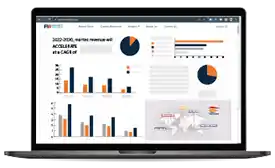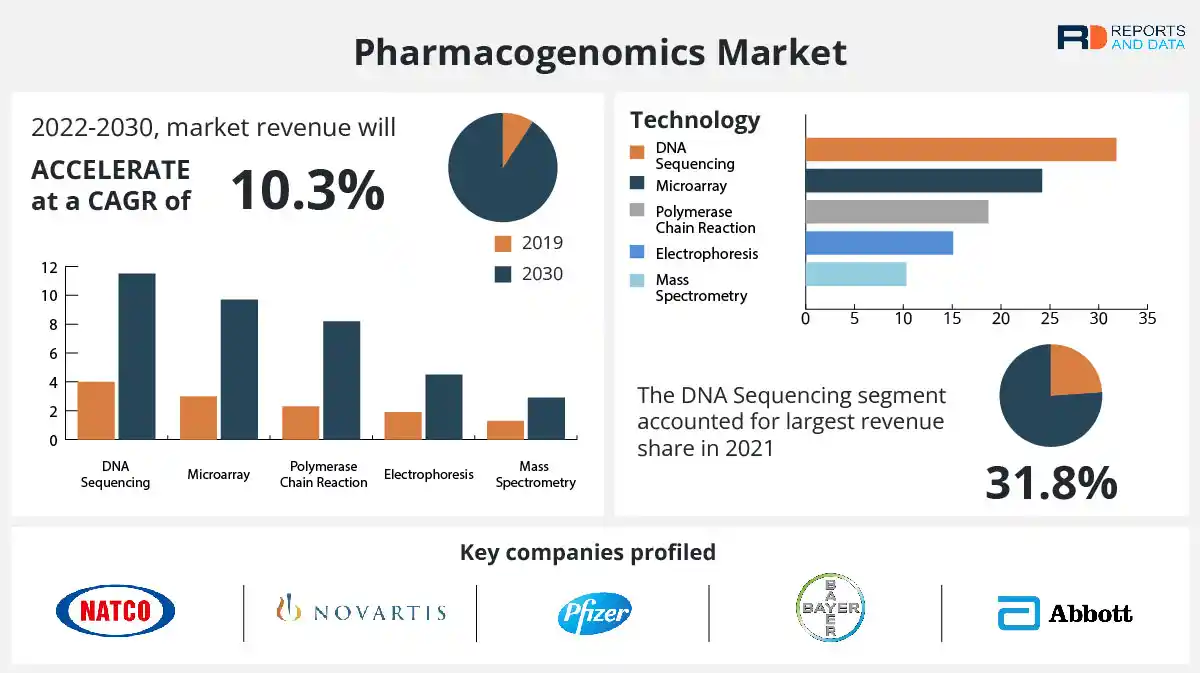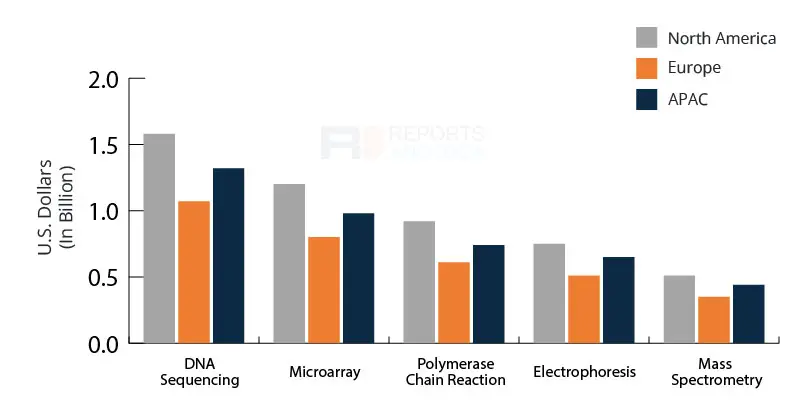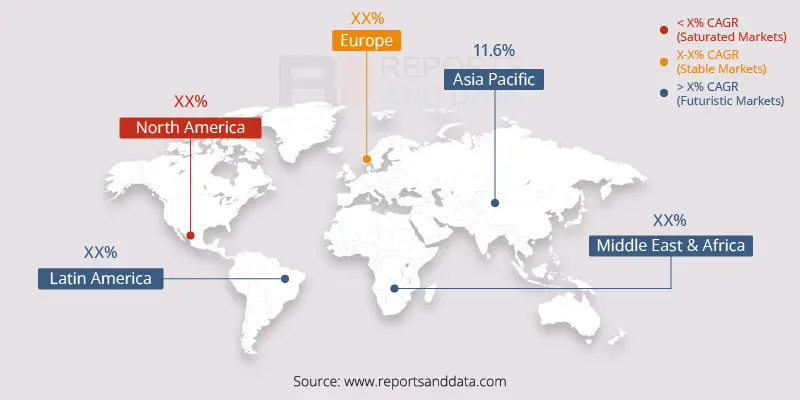Want to curate the report according to your business needs
Report Description + Table of Content + Company Profiles

The global pharmacogenomics market size was USD 15.23 Billion in 2021 and is expected to register a revenue CAGR of 10.3% during the forecast period. Rising prevalence of chronic diseases, such as cancer, tuberculosis, HIV, and others, growing awareness of the patient population for personalized therapy and medication, and investments in Research & Development (R&D) are major factors driving market revenue growth. Pharmacogenomics is helpful for exploring the role of genetic variation in effects of drugs that contributes to translational and pharmaceutical research, which is further impacting demand for pharmacogenomics globally. This is further developing its importance in different fields, such as genome sequencing, genetic testing, DNA Sequencing, personalized medicine, mutation, drug development, and others, owing to its impacts on individualized treatment. Pharmacogenomics is a significant solution in the medical industry as it is used in safer drugs, powerful medicines, better vaccination, advanced screening of drugs, and reduction in overall cost and treatment in health setup, thus is expected to rise demand for pharmacogenomics accordingly.
According to WHO, cancer is one of the leading causes of death worldwide, which accounts for almost 10 million deaths in 2020. Different cancer-causing infections, such as hepatitis and Human Papillomavirus (HPV), are causing 30% of the total cancer cases mostly in low- and lower-middle-income countries. Precision medicine aims at customizing health care, with decisions and treatments tailored to each individual in every way possible. For instance, Genelex's pharmacogenetics testing platform offers a comprehensive suite of tools to help healthcare providers personalize medication regimens based on a patient’s genetics. It is a relatively new field to develop effective and safe medications and doses that will be tailored to an individual’s genetic Makeup. Accurate genetic profiling of patients has benefited a sizeable number of patients in oncology, neurology, and many other diseases.

Covid-19 pandemic is another major factor that has risen demand for genomics due to increased usage to study COVID-19 virus. During pandemic, genetic databases were extensively used to address susceptibility to SARS-CoV-2 infection and for genetic severity. Genome-Wide Association Studies (V) approach has been employed for unfolding common variants including biological networks and host-pathogen interactions. AI-enabled genomic surveillance has observed around 6,000 mutations during gene spike of SARS-CoV-2. For identifying covid-19 variants in virus strains and understanding the severity of genomics has a major mechanism in the process. Genomic and Precision Health (GPH) technology has played a significant role in investigating and responding to public and medical health during Covid-19., while demand for the genomic market kept rising even in such a crisis moment.
Growing emphasis on precision medicine is expected to drive market for pharmacogenomics owing to the purpose of precision medicine method to integrate genetic and environmental information about diseases and their responses to therapies. For instance, in June 2020, in the pharmaceutical sector, Infosys announced the launch of a personalized medicine solution to digitally modernize their operations and produce better financial results. It is expected to expand significantly as a result of quick development of Digital technologies and biological advancements. Digital technologies can assist pharmaceutical companies in hastening their time to market and improving patient experiences, which will drive market growth. In addition, over time, spending on R&D has increased, which is expected to further drive market growth. Demand for personalized medicine across the globe is rising demand for pharmacogenomics. For instance, in October 2021, Israel Precision Medicine Partnership (IPMP) granted funds totaling approximately USD 9.9 million to 11 projects in Israel for the study of personalized medicine, which includes cancer, Crohn's disease, and uncommon disorders.
Single pharmacogenomics testing cannot be used for determining the way of medication and these tests are not applied for all medications, which is expected to restrain market revenue growth. High cost of testing, medical infrastructure, and lack of knowledge and skills among researchers and lab workers are also negatively impacting market growth. The old medical infrastructure and health care centers are lacking from advanced technologies in various underdeveloped health care centers, which are expected to affect drug consumption. It is important to develop the existing infrastructure for high-complexity testing.
Storing and sharing genomic data has become challenging as a single genome consumes around 100 gigabytes. After continuous sequencing, requirements reach petabytes, exabytes from gigabytes. For storing human genomic data, around 40 exabytes of storage can be required by 2050, which can be difficult in the future.
Based on technology, the pharmacogenomics market is segmented into Deoxyribonucleic Acid (DNA) sequencing, microarray, Polymerase Chain Reaction (PCR), electrophoresis, and mass spectrometry. The DNA Sequencing segment accounted for largest revenue share in 2021. Increased importance of sequencing for cancer treatment has introduced a parallel technology and Next-Generation Sequencing (NGS), which offers scalability, speed, and ultra-high throughput. The sequencing technology including preparation of templates, sequencing, imaging, and data analysis is beneficial for determining orders of nucleotides in targeted regions of Ribonucleic Acid (RNA) or DNA and in entire genomes. Recent innovation of Ion Torrent sequencing by Thermo Fisher Scientific enables simple, massive, and fast scalable sequencing. Massive use of parallel sequencing and semiconductor chips helps to implement sufficient workflow for research regarding oncology, inherited diseases, infectious diseases, human identification, reproductive genomics, and agrigenomics. These are creating opportunities in healthcare, thus driving revenue growth of this segment.
The Polymerase Chain Reaction (PCR) segment is expected to register a steady revenue growth rate during the forecast period. Genetic Engineering, specifically, cloning of DNA fragments, which is used for modifying microorganism genomes, plants, and animals, supported by PCR genetic technology, which can generate faster results, improve treatment decisions, and also reduce medical costs. PCR, also known as molecular photocopying, is significant for generating copies of small DNA segments, which is required for genetic and molecular analysis in forensics and DNA profiling. Improved health care and medical facilities are driving demand for PCR in DNA fragments, gene profiling, and genomic analysis. Reverse Transcription PCR (RT-PCR) for SARS-CoV-2 was designed for detecting viral RNA. Furthermore, development of effective technologies is driving revenue growth of this segment. Almost 79,611,982 tests were done in the U.S., in public health labs and CDC labs, for Covid-19, including RT-PCR and antigen tests.

Based on application, the pharmacogenomics market is segmented into drug discovery, pain management, neurological diseases, oncology, Cardiovascular Diseases (CVD), psychiatry, and infectious diseases. The drug discovery segment accounted for largest revenue share in 2021. Development of advanced technologies has enabled doctors and researchers to look for targeted therapy, personalized medicines, and unique medications depending on the type of disease. Furthermore, importance of unique gene expression and targeted medication for curing complex diseases are impacting growth of this segment, while extensive use of pharmacogenomics is generating higher revenue for this segment.
The CVD segment is expected to register a steady revenue growth rate during the forecast period. Early diagnosis of chronic diseases increases chance of successful treatment and genomics, which can detect complex diseases before any symptoms are visible. It plays as a preemptive measure by identifying alterations in genes for critical diseases such as cancer. Even after the development of symptoms, genomics plays an instrumental role in diagnosing critical diseases. In addition, efficiency of treating diseases early is also expected to drive revenue growth of this segment.
Based on end-use, the pharmacogenomics market is segmented into hospitals & clinics, research institutes and academic institutes, and others. The hospitals & clinics segment accounted for largest revenue share in 2021. Growing awareness among individuals and health professionals is driving demand for pharmacogenomics specifically for advanced drug development and advanced technologies accordingly. In addition, increased therapeutic index is expected to drive market growth during the forecast period. Recently, hospitals are well-equipped molecular diagnostic lab units that can meet various patient requirements. Moreover, hospital pharmacogenomics lab facilities are well-equipped with extremely advanced equipment. Growth of hospitals has been fueled by superior infrastructure and technological edge over other medical facilities, presence of highly skilled medical professionals, and preference of patients for them over other healthcare facilities, which is expected to dominate the global pharmacogenomics market.
The research institutes and academic institutes segment is expected to register a steady revenue growth rate during the forecast period. Growing cancer cases and cardiovascular diseases are encouraging researchers to innovate drug development for personalized treatment, gene sequencing, and others. In addition, extensive use of pharmacogenomics as a technique for tailored medications to treat diseases, such as cancer and other infectious diseases including tuberculosis, HIV/AIDS, and others, is being used in research institutions, which is expected to drive market growth.
Based on regional analysis, the North America market accounted for largest revenue share in 2021. Drug development, discovery activities, and growing investment in personalized medicine are expected to rise demand for pharmacogenomics in this region. Also, robust healthcare infrastructure along with prevalence of various chronic diseases is growing importance of incorporating pharmacogenomics in the process of overall treatment. According to research, in the U.S. around six of ten adults are living with chronic diseases, such as heart diseases, diabetes, and cancer, which is encouraging manufacturers to take initiative for improving treatment procedures. For instance, on 19 May 2022, Invitae announced to launch expanded pharmacogenomics panel and a specialized mental health panel. This new 38-gene testing panel and tool for clinical decision support can analyze genetics of patients and support co-medications for impacting dose and drug personalization, which is further used in medications for high-risk patients specifically for primary care, endocrinology, cardiology, oncology, and pain management.
The European market is expected to register a steady revenue growth rate during the forecast period. Growing awareness for targeted treatment and genetic testing are rising demand for pharmacogenomics in this region. According to research, around 4 million UK patients could be benefitted annually from genetic testing before prescribing common medicines. It has been observed that individual pharmacogenomics testing has changed dose or drug of almost 9.1% of the total patients, which is expected to drive revenue growth in this region. Also, according to research by British Pharmacological Society and Royal College of Physicians, personalized testing has become important for ensuring effectiveness and safety of common medicines to be offered throughout National Health Service in this region, which is driving market revenue.
The Asia Pacific market is expected to register a moderate revenue growth rate during the forecast period. Change in lifestyle, growing number of critical patients suffering from target diseases are expected to drive demand for pharmacogenomics in this region. Several novel pharmacogenomics associations have emerged in Asian countries from Japan, Korea, and others. According to a recent study, the current growth rate for federal research funding in China greatly exceeds that in the U.S. and European Union. Also, companies are partnering with other pharmacogenomics solution providers for advancing the process of diagnosis. For instance, Chinese biotechnology company, MGI announced a partnership with Nalagenetics for advancing and expanding pharmacogenomics in Indonesia and Singapore. This partnership aims at addressing critical issues in pharmacogenomics through sequencing improvement accordingly.

Competitive landscape of the pharmacogenomics market is consolidated with a few key players operating on global and regional levels. Key players are engaged in product development and strategic alliances to expand their respective product portfolios and gain a robust footing in the global market. Major players in the market include Abbott, Bayer AG, NATCO Pharma Limited, Lupin, Merck & Co., Inc., Novartis AG, Pfizer Inc., Takeda Pharmaceutical Company Limited, F. Hoffmann-La Roche Ltd, and GeneTech.
On 4 April 2022, Castle Biosciences announced to acquire AltheaDx which is a molecular diagnostic company at its commercial stage. AltheaDx is also specializing in pharmacogenomics testing services for focusing on mental health. This acquisition aims at developing various pharmacogenomics testing, such as IDgenetix, which can test for anxiety, depression, and other mental health conditions.
On 3 February 2021, EmpiRx Health launched the pharmacogenomics solution that is designed for delivering increased value and improving health outcomes. This product launch was in partnership with OneOme, an pharmacogenomics solution provider, which aims at offering the role of genetics in health management, drug interactions, and others.
This report offers historical data and forecasts revenue growth at a global, regional, and country-level, and provides an analysis of the market trends in each of the sub-segments from 2019 to 2030. For this study Reports and Data has segmented the pharmacogenomics market based on technology, application, end-use, and region:
| PARAMETERS | DETAILS |
| The market size value in 2021 | USD 15.23 Billion |
| CAGR (2021 - 2030) | 10.3% |
| The Revenue forecast in 2030 |
USD 36.74 Billion |
| Base year for estimation | 2021 |
| Historical data | 2019-2020 |
| Forecast period | 2022-2030 |
| Quantitative units |
|
| Report coverage | Revenue forecast, company ranking, competitive landscape, growth factors, and trends |
| Segments covered | By Technology Outlook, Application Outlook, End-Use Outlook, Regional Outlook |
| By Technology Outlook |
|
| By Application Outlook |
|
| By End-Use Outlook |
|
| Regional scope | North America; Europe; Asia Pacific; Latin America ; Middle East & Africa |
| Country scope | U.S.; Canada; U.K.; Germany; France; BENELUX; China; India; Japan; South Korea; Brazil; Saudi Arabia; UAE; Turkey |
| Key companies profiled | Abbott, Bayer AG, NATCO Pharma Limited, Lupin, Merck & Co., Inc., Novartis AG, Pfizer Inc., Takeda Pharmaceutical Company Limited, F. Hoffmann-La Roche Ltd, and GeneTech. |
| Customization scope | 10 hrs of free customization and expert consultation |
Facing issues finding the exact research to meet your business needs? Let us help you! One of our Research Executives will help you locate the research study that will answer your concerns. Speak to Analyst Request for Customization
Request a FREE Sample here to understand what more we have to offer over competition…
upto20% OFF
upto20% OFF
Want to curate the report according to your business needs
Report Description + Table of Content + Company Profiles
